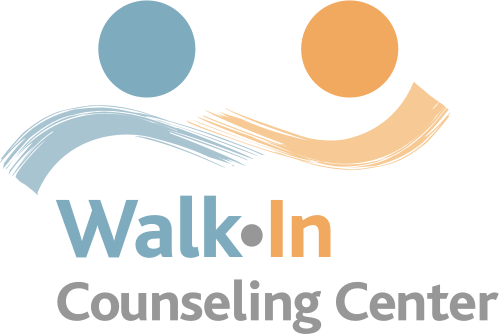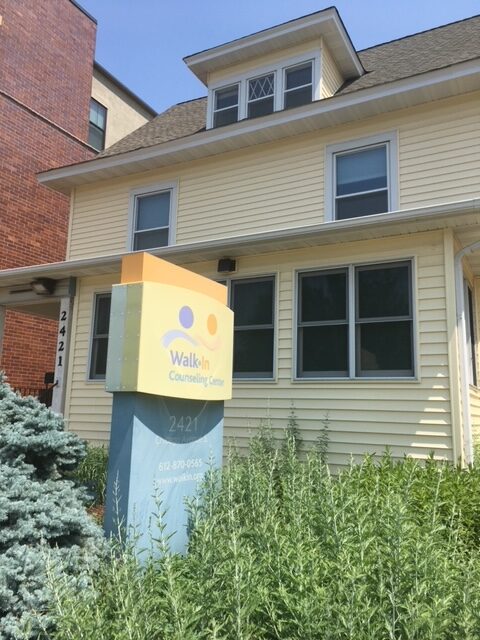To read the article on the MinnPost website, click here.
Free mental health clinic in Minneapolis prioritizes accessibility, moves for diverse representation in clinicians
By Deanna Pistono
Online and in an unassuming house on Chicago Avenue, volunteer mental health care providers see clients free of charge at Minneapolis’ Walk-In Counseling Center. There’s no need for an appointment – simply show up in person or virtually on Monday, Wednesday or Friday.
“We don’t have a preset agenda,” said Jane Ginsberg, clinic director at Walk-In. “The only thing we need to know about them (clients) is whatever they think would be helpful for us to know to be able to help them. I think that approach makes us able to be seen as a trusted resource for folks who really have good reason not to trust a lot of the institutions that are supposedly set up to help them.”
Volunteers at Walk-In are required to have a masters’ or doctorate in “psychology, social work, professional counseling, marriage or family therapy or other related program,” or be student interns working towards those degrees. No insurance is billed for visits, and clients are free to use a nickname or a pseudonym at Walk-In, unless they need their legal name on documents for outside review, such as documents requesting school or work accommodations or absences.
“One person that comes to mind had just had two deaths in the family and had used up their bereavement leave but just really needed extra time,” said Kathy Weber, Ph.D., a retired psychologist and Walk-In volunteer. “During COVID, there were people from other countries going to school here who were unable to return to their home countries and who lost … family members through COVID and were not able to go back. They needed documentation so that they wouldn’t be penalized by their school for dropping classes or for taking a semester off.”

If they choose, clients can be seen completely anonymously.
“For a lot of our clients, (anonymity is) pretty important because a large portion of our clients are people who are from fairly marginalized communities,” Ginsberg said. “Sometimes they’ve had run-ins with the law or they may be undocumented. … We can do that because we don’t bill insurance, we don’t have government contacts, so we can really preserve people’s anonymity.”
The clinic has been operating since 1969, when, according to Ginsberg, various free clinics were “springing up” around the nation. She believes Walk-In may be one of the last of these clinics still operating.
Weber has volunteered at Walk-In since 2019, after missing work and wanting to “keep updated” on developments in the field of mental health. Though she now has a more supervisory role at Walk-In, Weber noticed a wide variety of clients utilizing Walk-In’s services when she was seeing clients regularly.
“Because of the neighborhood (Walk-In is) in, (there is) a lot of racial diversity as well as all the economic diversity,” said Weber. “I remember seeing people then who were very highly educated, highly functional, but for various reasons didn’t want to use insurance for maybe their professional privacy … all the way to the most destitute of people, who don’t have a home to live in.”
The clinic is committed to making therapy not only more accessible but to increase representation within mental health professions. According to Walk In’s 2022 report, which was updated in 2023, 49% of their clients were non-white. A Healthcare Workforce survey conducted by the Minnesota Department of Health from 2021 to 2022, however, indicated that 88% of Minnesota’s mental health care providers are white.
“We’re certainly not where we would love to be in terms of the diversity of our counselor base,” Ginsberg said.

To support early career mental health care providers of color, Walk-In offers a Licensing Diversity Award, which helps recipients cover the costs of becoming licensed to practice in Minnesota. The 2024 award closed applications this year on Feb. 16 and will cover costs up to $2,500 for licensing preparation, fees and supervision for up to four recipients. Ginsberg described this award as Walk-In’s “small way” to take a “step towards helping get people who are working to try to get into the field to get in.” Walk-In, Ginsberg said, hopes and expects recipients to volunteer with them in order to help the organization “achieve the diversity in our counselor group that reflects the diversity of our clients.”
Walk-In is also able to refer clients to other services, according to Weber. These services include immigration assistance, domestic violence shelters, and housing referrals. If a client is in need of longer term counseling and/or psychiatric help, volunteers can also refer them to other mental health services, including low cost community resources or services with sliding fee scales.

Deanna Pistono
Deanna Pistono is MinnPost’s Race & Health Equity fellow. Follow her on Twitter @deannapistono or email her at dpistono@minnpost.com.

